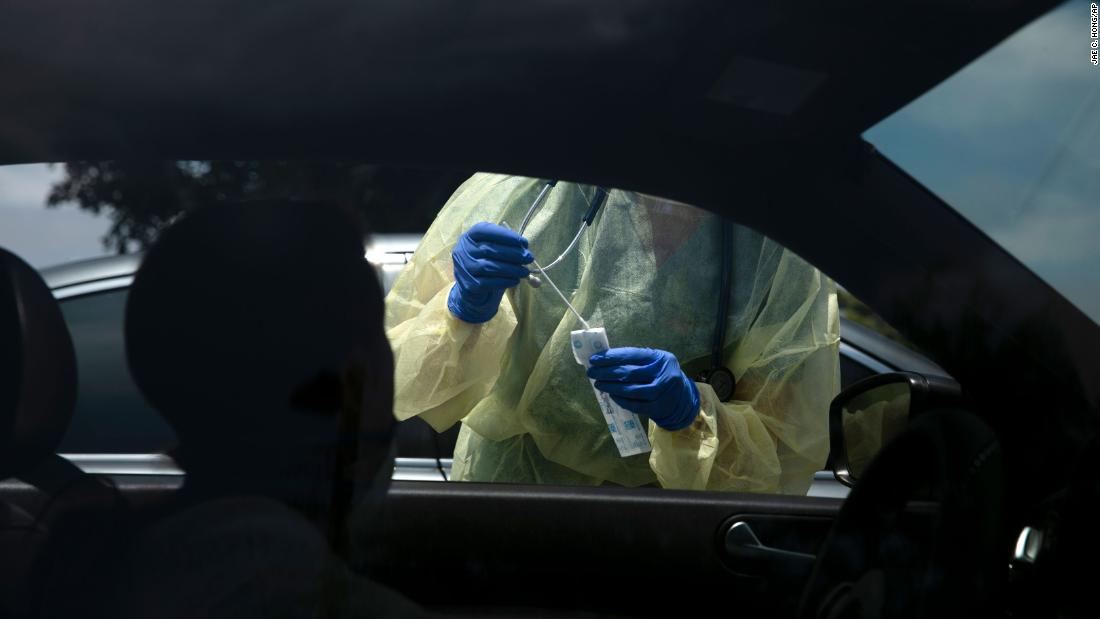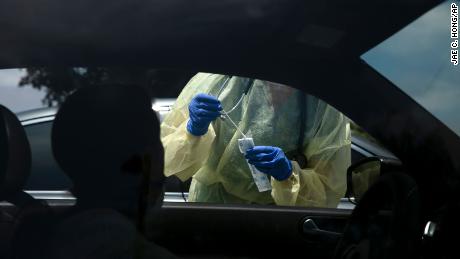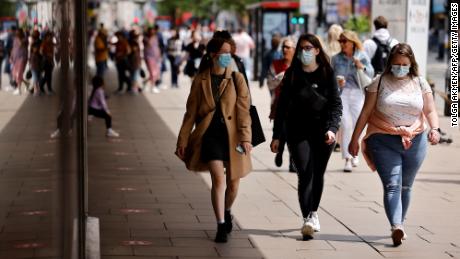Fully vaccinated people may deal with symptoms if they become infected, but experts warn it’s not likely to progress to hospitalization or death
So far, the coronavirus vaccines available in the United States provide strong protection against coronavirus, including the Delta variant that now dominates in the US. As of right now, there isn’t evidence that immunity is beginning to wear off among people who got Covid-19 vaccines in December or January, or that they’re at higher risk for breakthrough infections, Dr. Jay Butler, the deputy director for infectious diseases at the US Centers for Disease Control and Prevention, said during a briefing Tuesday.
And for the fully vaccinated, the CDC guidance around testing, quarantine and isolation after exposure to someone with Covid-19 is different.
“What they are saying is that if you’re fully vaccinated, the chance of you becoming infected with (coronavirus) is much lower, and the chance of you being an asymptomatic carrier is also much reduced, because even if you were to be infected, you’re carrying much less virus and therefore are less able to pass it on to others,” said CNN medical analyst Dr. Leana Wen, an emergency physician and visiting professor of health policy and management at the George Washington University Milken Institute School of Public Health.
“The issue, though, is with the Delta variant,” Wen added. “The Delta variant seems to be present in larger quantities in infected (unvaccinated) people.”
What’s not yet fully known is how much the Delta variant could affect the transmission-blocking capacity of the coronavirus vaccines, said Dr. Albert Ko, the chair of and a professor in the department of epidemiology and microbial diseases at the Yale School of Public Health.
If you’re fully vaccinated but were exposed to Covid-19 or are experiencing related symptoms, here’s what you should consider in regard to monitoring symptoms, testing, quarantining and more.
When vaccinated people should get tested
If an asymptomatic fully vaccinated person has a known or suspected exposure to Covid-19 but doesn’t get tested, they should still watch for symptoms in the two weeks after.
But testing is widely available and generally easy to access. In contrast to the CDC’s guidance, Wen advises vaccinated people who spend extended periods of time around an infected, symptomatic person to get tested and quarantine for seven days before getting another test if the first test was negative.
“The CDC guidance, at the moment, lacks nuance — as in, there is a difference between if you have a passing interaction with a colleague at work who then turns out to have Covid versus if you are living at home and caring for somebody who has Covid. That’s just very different,” Wen said. “Even if people are not symptomatic but they have prolonged, close contact with somebody, it is prudent for them to quarantine and be tested, too.”
Wen encourages vaccinated people to carefully consider any interactions they might have after being exposed to someone who has Covid-19.
“I think we need to use some common sense here. I don’t want someone coming into work, who then tells me that they just spent the entire night caring for their spouse who’s ill from Covid,” Wen added. “Should that person really be in a crowded conference room with a whole bunch of other people? Does that sound right? It doesn’t meet the common sense test.”
For the vaccinated or unvaccinated, symptoms should trigger a test, US Surgeon General Dr. Vivek Murthy said on CNN’s New Day on Tuesday.
“We have seen that many people are actually not getting tested around the country, even though they have symptoms,” Murthy told CNN’s Brianna Keiler. “Many people are thinking, ‘Oh Covid’s over. Why do I really need to get tested?’ and this is particularly happening in areas, unfortunately, where the vaccination rates are low, which is exactly where we want to be testing more.”
But before vaccinated people — including US citizens — board a flight from anywhere abroad to the US, they must have a negative coronavirus test result or documentation of recovery from Covid-19, the CDC has said. Alternative documentation includes proof of antibodies or the absence of symptoms, Ko said. The CDC has also recommended that international travelers arriving in the US get a coronavirus test three to five days after travel regardless of their vaccination status. After traveling internationally, vaccinated people don’t need to quarantine unless they are showing symptoms.
What to do if you’re vaccinated and test positive
- Fever or chills
- Cough
- Shortness of breath or difficulty breathing
- Fatigue
- Muscle or body aches
- Headaches
- New loss of taste or smell
- Sore throat
- Congestion or runny nose
- Nausea or vomiting
- Diarrhea
If you’re exposed to Covid-19, asymptomatic and living with people who are unvaccinated or immunocompromised, you should get tested as soon as possible, Wen said. “Even if that test were negative, I would continue to quarantine from those vulnerable family members for seven days and then get another test,” she said.
If that test result is negative, you can consider ending your quarantine and just watching for any symptoms for another week, Ko said.
“The current vaccines certainly are very protective against death and hospitalizations,” he added, but “we want to err on the (side of) caution.”
What to expect if you’re infected
If you develop symptoms from a coronavirus infection, you’ll be less sick than if you weren’t vaccinated, Wen said. There may be uncomfortable symptoms, but it’s not likely to progress to hospitalization, and extremely unlikely to lead to death. US health officials have reiterated that more than 99% of US Covid-19 deaths in June were among unvaccinated people, and with plenty of vaccines available, death from Covid-19 is preventable.
“If you had not gotten vaccinated, you might have ended up in the hospital,” Wen added. “But because you got the vaccine, you have muscle aches and a fever that go away within a few days. I mean, that’s (a) testament to the power of the vaccine.”
This happens because coronavirus vaccines reduce the viral load an infected person has in their nose, mouth and eyes, Ko said.
“That’s important because that viral load is a key determinant in transmitting to other people,” Ko said. “Overall, there’s really good evidence that these vaccines are protective against transmission or have transmission-blocking capacity. The question now here is how effective that is against these new variants like Delta, and how long that will last us for.”
CNN’s Jamie Gumbrecht and Maggie Fox contributed to this story.
![]()






